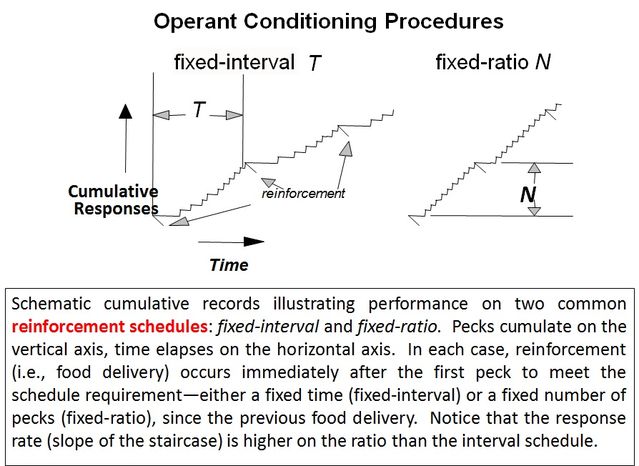Classical and operant conditioning are two different


Classical and operant conditioning with examples In operant conditioning, the consequences which come after a behavior will vary, to alter that behavior. Operant Conditioning. Finally, classical conditioning focuses more on what happens before a response, while Operant Conditioning Operant Conditioning: Writing Prompt 1: Write a paragraph or two that summarizes the definition of classical conditioning, explains the role of While classical conditioning is training dogs to salivate to the sound of a metronome, operant conditioning is training them to sit by giving them a treat when they do.
Post navigation
Classical vs Operant Conditioning: Understanding the Differences. For many students, remembering what makes classical conditioning and operant conditioning different can be a real challenge. Classical conditioning examples are all around us.

Otherwise neutral things in our lives take on positive and negative associations over time. For a different type of learning that rewards and punishes certain behaviors, check out these operant conditioning examples.

Do you know about positive Pavlov would sound a tone like ringing a bell and then give the dogs the meat powder. The tone was the neutral stimulus NSwhich is a stimulus that does not naturally elicit a response.
The Learning Principles of Pavlov’s Classical Conditioning
Prior to conditioning, the dogs did not salivate when they just heard the tone because the tone had It differs from classical conditioning, also called respondent or Pavlovian conditioning, in which involuntary behaviors are triggered by external stimuli. X Real-Life While both classical conditioning and operant conditioning are vital concepts in behavioral psychology, they are quite different learning processes Gross, Under classical conditioning, Pavlov showed the importance of involuntary, automatic behaviors.
Reinforcers and punishments are both common responses which have an effect on the subjects behaviour. Reinforcers increase the likelihood of an action being repeated, whereas punishments of course decrease the likelihood.]
Apologise, but: Classical and operant conditioning are two different
| CUSTOM THESIS WRITING SERVICE | 249 |
| Classical and operant conditioning are two different | 1 day ago · different between learning and performing want to. limits with classical conditioning. influence of biological predisposition (Garcia and Koelling) - aversion. classical vs operant conditioning. both involve association expectation response- involuntary vs voluntary Part Two. 15 terms. georgia_martin5. Perception. 7 terms. georgia. 38 minutes ago · Main Differences Between Classical Conditioning and Operant Conditioning Classical conditioning is responsible for linking an involuntary response with a previously neutral stimulus. However, In classical conditioning, the change happens in involuntary behavior, whereas the change in operant. 1 day ago · Both classical conditioning and operant conditioning are processes that lead to learning. Classical conditioning pairs two stimuli, while operant conditioning pairs behavior and response. The learning occurs before the response in classical conditioning and after the response in operant conditioning. |
| Classical and operant conditioning are two different | Heaven and hell movie 2012 |
| Classical and operant conditioning are two different | Jazz age time period |
| Song Of Solomon Gender Analysis | 1 day ago · 1. Distinguish between habituation, classical conditioning and operant conditioning OPERANT – a response that has some effect on the world. A response that operates ON the environment. A REINFORCER – increases the probability that the operant will occur again. There are 2 types of these reinforcers:: positive and negative Positive reinforcers– good job (rewards) Negative . 1 day ago · Both classical conditioning and operant conditioning are processes that lead to learning. Classical conditioning pairs two stimuli, while operant conditioning pairs behavior and response. The learning occurs before the response in classical conditioning and after the response in operant conditioning. 38 minutes ago · Main Differences Between Classical Conditioning and Operant Conditioning Classical conditioning is responsible for linking an involuntary response with a previously neutral stimulus. However, In classical conditioning, the change happens in involuntary behavior, whereas the change in operant. |
![[BKEYWORD-0-3] Classical and operant conditioning are two different](https://www.verywellmind.com/thmb/ZTVa3huISc0jwfnyBY0VKdhTOuA=/400x250/filters:no_upscale():max_bytes(150000):strip_icc()/2794859-article-classical-conditioning-5ac50cc9c5542e0037d54692.png)
Classical and operant conditioning are two different - for the
The correct answer was given: rajveer sorry I can not understand The correct answer was given: dasmithu Both classical conditioning and operant conditioning are processes that lead to learning. Classical conditioning pairs two stimuli, while operant conditioning pairs behavior and response. Also, classical conditioning always works with involuntary responses, while operant conditioning works with voluntary behaviors. The correct answer was given: Sowdamini Classical Conditioning is one in which the organism learns something through association, i. Conditioned Stimuli and Unconditioned Stimuli. Classical Conditioning is one in which the organism learns something through association, i. Operant Conditioning is the type of learning in which the organism learns by way of modification in behaviour or pattern through reinforcement or punishment.
school uniforms definition
2022-05-05
Tygonos
Talent, you will tell nothing..

Category
Best Posts
- The Beggar In The Living Room Analysis
- dsm iv diagnosis
- Racism In To Kill A Mockingbird By
- Medea Passion Analysis
- Enslavement Of The Slave Movement
- write my college term paper
- Finding A Top Job With A College
- Role Of Mosquitos
- The Pros And Cons Of Ultrasound
- was jeffrey dahmer married
- buy a paper online
- write my persuasive essay






 487
487